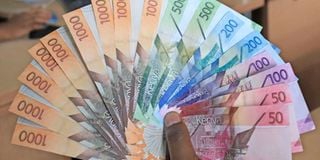Premium
Bulk money transactions decline to 8-month low

The value of bulk bank money transfers of more than Sh1 million fell to an eight-month low in October driven by economic slowdown amid high interest rates and inflation.
The value of bulk bank money transfers of more than Sh1 million fell to an eight-month low in October driven by economic slowdown amid high interest rates and inflation.
Central Bank of Kenya (CBK) data shows that transactions cleared and settled through the Kenya Electronic Payments and Settlement System and Real Time Gross Payment System (KEPSS/RTGS) fell to Sh2.98 trillion in October.
It was the lowest value of monthly transactions cleared through the system in eight months since February when Sh2.54 trillion was cleared through KEPSS/RTGS.
The average value of each transaction also fell to Sh4.99 million – the lowest since March – signalling that individuals and businesses had less money to move during the period.
Real-time bulk transactions had hit a record high of Sh3.67 trillion in June driven by increased government spending ahead of the August 2022 polls and heightened campaign activities by politicians who splashed millions of shillings on campaign events and materials to woo voters.
The CBK requires banks to strictly process and settle payments from Sh1 million through the real-time RTGS/ KEPSS system where cash reflects within four hours of getting instructions. These payments however fell 11.4 per cent from August amid the transition to a new government.
President William Ruto quickly announced a raft of austerity measures to cut the fiscal deficit including chopping the budget by Sh300 billion targeting non-essential expenditure in government including travel, entertainment, airtime, communication and accommodation.
The private sector is also reeling from the effects of high inflation, increased interest rates and a weaker shilling which have increased the cost of doing business amid restricted spending from consumers.
Inflation hit a five-year high of 9.59 per cent in October driven by high costs of fuel, food and other essential goods and services.
In May, the CBK raised the base lending rate to 7.5 per cent from 7 per cent – the first increase of the rate since May 2015 – to tame inflation leading to increased lending costs.
Kenya’s gross domestic product (GDP) grew by 4.7 percent in the third quarter ended September from 9.3 per cent in a similar period, according to the Kenya National Bureau of Statistics (KNBS).
A recent survey by the CBK shows investors maintain a grim short-term outlook for economic growth due to the prevailing tough economic conditions.
“Respondents highlighted some risks to growth expectations including the underperformance of the agricultural sector, cited by 50 percent respondents, and high inflation lowering household consumption, high cost of goods largely due to higher fuel cost and raw material cost due to the war in Ukraine,” said the survey.





